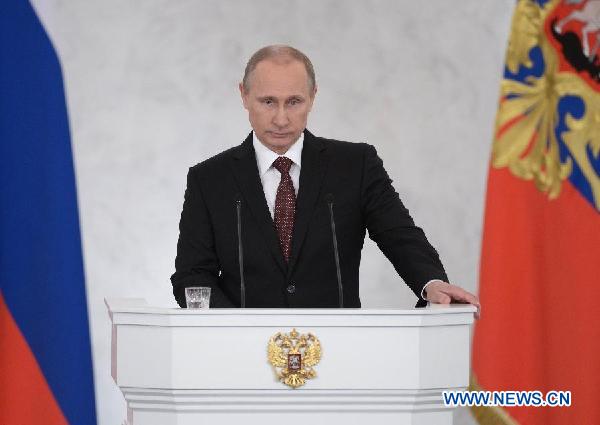 Ballerinas anywhere but onstage
Ballerinas anywhere but onstage
 Top 10 safest airlines in the world
Top 10 safest airlines in the world
 Top 10 most popular instant messaging apps in the world
Top 10 most popular instant messaging apps in the world
 Inspiring shadow images of Chinese army
Inspiring shadow images of Chinese army
 Models shine Xinjiang auto show
Models shine Xinjiang auto show
 From laid-off worker to int'l referee in bodybuilding
From laid-off worker to int'l referee in bodybuilding
 Selected photos of 'two sessions'
Selected photos of 'two sessions'
 Most unusual taxis around the world
Most unusual taxis around the world
 Bridge Worship Festival in Taijiang, SW China
Bridge Worship Festival in Taijiang, SW China
 |
| Russia's President Vladimir Putin addresses a joint session of Russian parliament on Crimea in the Kremlin in Moscow, Russia, March 18, 2014. Russian President Vladimir Putin signed an agreement on Tuesday accepting the Republic of Crimea and the city of Sevastopol as part of its territory, live TV broadcast showed. (Xinhua/RIA Novosti) |
Recommend: What cards is Russia holding?
In the long term, Crimea is more than a name attributed to a region; it is all about Vladimir Putin's diplomatic policy, Russia's international profile, and its internal image.
The Crimean peninsula has always been a political hot potato, and a regular centre of historical disputes. Russian President Vladimir Putin's speech in the Kremlin on March 18 added a new chapter to Crimea's history. Putin's speech was not so much a statement of his position, as a political declaration on how Russia will revive under his rule.
In addition to its general strategic importance, the Crimean peninsula is the military port for the Black Sea Fleet, and therefore the key pivot by which Russia controls the Black Sea and access to the Mediterranean Sea. Crimea is a touchstone of the relationship between Russia and Ukraine, which itself forms a significant part of Russian history. During the period when Russia had a warm relationship with Ukraine, Russia’s garrison in Crimea was considered as a link between the two countries. But in this dispute Russia cannot respect the wishes and interests of both Ukraine and Crimea. Therefore, in the face of huge pressure from the West, Putin has made his choice of sides. The result of the Crimean referendum has placed the U.S and Europe in a difficult position.
It is clear that Russia's revival will not proceed without difficulties and challenges. Putin's swift response to the Ukrainian political handover shows how close the Ukrainian issue comes to the core of Russia’s vital interests. Crimea's new union with Russia can be considered as an important declaration that Russia will act to defend what it perceives to be its interests and its security.
It seems that in Putin's eyes, Russia's revival must be ready to take on any challenge to its security interests from its neighbors, and especially from Europe. In cases such as Georgia and Ukraine, Russia's 21st century renaissance has already faced challenges from countries of the former Soviet Union. The West recognizes Putin as a powerful politician, but neither the U.S. nor the Western European countries can know exactly what strategies and measures he has in mind. Crimea's new union with Russia marks the beginning of a new game between Russia, the U.S. and Europe.
In the short term, no party wants to take any action that might trigger armed conflict; in the long term Crimea may prove to be much more than a territorial annexation by Russia - it is also a manifestation of Putin's diplomatic strategy and a symbol of the country's political dignity and successful image.
The article is edited and translated from 《克里米亚入俄:一份俄罗斯复兴宣言?》, source: The Beijing News, author: Shang Han
 Female journalists at 'two sessions'
Female journalists at 'two sessions' Interpreters serving 'two sessions'
Interpreters serving 'two sessions' Female SWAT team in Chongqing
Female SWAT team in Chongqing Top 10 safest airlines in the world
Top 10 safest airlines in the world Old photos of Anti-Japanese War
Old photos of Anti-Japanese War Mysterious 'Dolan Tribe' in Xinjiang
Mysterious 'Dolan Tribe' in Xinjiang A bite of Luoping County
A bite of Luoping County This is Shanghai
This is Shanghai Chinese airborne troops complete parachute training in various training bases
Chinese airborne troops complete parachute training in various training bases Ballerinas anywhere but onstage
Ballerinas anywhere but onstage Most unusual taxis around the world
Most unusual taxis around the world Micro-expression at 'two sessions'
Micro-expression at 'two sessions' Bridge Worship Festival in Taijiang, SW China
Bridge Worship Festival in Taijiang, SW China Hollywood documentary brings Diaoyu Islands truth to new audience
Hollywood documentary brings Diaoyu Islands truth to new audience Miss HK and actresses shine at flower show
Miss HK and actresses shine at flower showDay|Week|Month